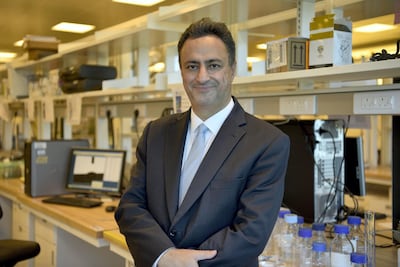A university professor told of his pride in receiving UAE citizenship for his significant contribution to the country.
Hassan Arafat, director of the Centre for Membranes and Advanced Water Technology at Khalifa University, Abu Dhabi, was among the first residents to secure citizenship as part of a new process announced by the country this year.
Sheikh Mohammed bin Rashid, Vice President and Ruler of Dubai, outlined the decision in January to nominate leading figures, including engineers, doctors and scientists, for citizenship in recognition of their outstanding work.
A top chemical engineer, Prof Arafat, 47, from Amman, Jordan, received an Emirati passport in March, a few weeks after he received a phone call to say he was nominated based on his scientific achievements.
"I actually get very emotional thinking about it and there is a feeling of joy," he told The National.
"It is an honour that has really humbled me.
“It’s like magic, like a switch you turn on. Suddenly I’m feeling part of something much bigger than my career."
His new status has had a positive effect on his work, too.
“It’s quite strange, my mindset even when I come to work has suddenly become different. I’m no longer thinking of what I want to achieve that day, I’m thinking about how what I do affects my university and the UAE,” Prof Arafat said.
“This is integrated in all my planning and work on a daily basis.”
Under the scheme, people will retain their original nationality, allowing for dual citizenship.
Five key roles in the citizenship drive





“It’s like suddenly having two families you belong to,” Prof Arafat said.
“Just like when you get married you are part of two families and you are very happy to have that.
"The UAE recognises that people have very strong sentimental attachment to their place of birth and place of original citizenship. The fact that they didn't want people to go through the pain of giving that up is amazing."
Prof Arafat has been working in the UAE since 2010 and lives with his wife and four children who are thrilled they can plan a long-term future in the country they call home.
“We are going through a phase where two children are finishing high school this year and they were uncertain about where they would go to university,” Prof Arafat said.
“We were considering all kinds of options and now it is quite obvious. This is your country, you go to school here.”
Prof Arafat is grateful for the seamless naturalisation procedure in which residents are nominated and do not need to apply.
“When you apply for citizenship to other countries you have to go through a lot of processes, you have a lot of documents to submit. Here the government has done the thinking and due diligence.
“That’s the exciting part. The time they invested in taking the initiative is remarkable.
“They didn’t need me to prepare a dossier and say this is what I have achieved.
“I don’t know of many governments that take the initiative to select who [they] want.”
Looking ahead, the professor has big plans for increased industry tie-ups for his research team, which works to create affordable and environmentally friendly water desalination solutions.
The centre he leads studies techniques to tackle water scarcity challenges with home-grown ideas that are energy efficient.
Prof Arafat is working to design nanomaterials that reduce the amount of energy and chemicals needed in the process to make seawater drinkable.
Desalination plants often use chemicals that pollute the environment and the research could have a global impact.
“These chemicals end up coming out in wastewater, which most of the time finds its way back into the oceans. So we don't want that, we want to reduce, cut the use of chemicals as much as possible,” he said.
Prof Arafat's work has won several awards, including the Khalifa Award for Education in 2017. The same year he was conferred with the Mohammed bin Rashid Medal for Scientific Excellence.
His international awards include the US Department of Energy Secretary Honour Award and the Mondialogo Engineering Award by Daimler AG and Unesco.
Prof Arafat wrote a book on achieving water and food security titled Desalination Sustainability: A Technical, Socioeconomic and Environmental Approach.
He was among the first group of 20 academics who shared a stage with Sheikh Mohammed when they were awarded golden residency visas in 2019.


